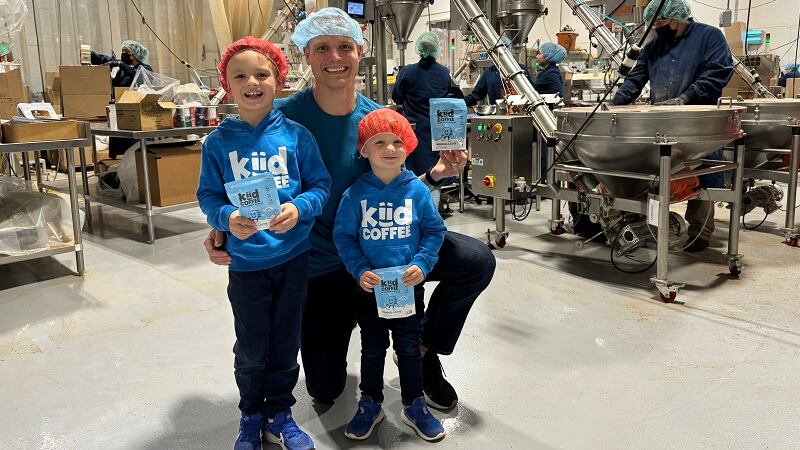“Certainly, coffee houses are not going away, but we are continuing to see more and more younger consumers drinking and preparing coffee at home,” Brittney Polka, VP of RTD beverages at Danone North America, told FoodNavigator-USA.
SPINS: Cold brew, private label options grow
The refrigerated ready-to-drink (RTD) tea and coffee segment reached $1.3 billion in sales, growing 6.5% in dollars and 4.6% in units, according to SPINS MULO data for the year ending Nov. 3.
Cold brew and private-label beverages growth drove the RTD category. RTD cold brew coffees achieved $572.07 million in sales, growing 14.3% in dollars and 10.6% in units, SPINS noted. Private-label RTD coffees represented a smaller segment with $33.14 million in sales but it outpaced cold brew, with dollar sales rising by 26% and units by 19%.
Shelf-stable coffee and hot cocoa represented the largest coffee market with $12.37 billion in sales, with dollar sales decreasing by 1% and units rising by 0.6%, as coffee grounds were flat in units and dollars declined by 2.1%, for the same period.
Elsewhere, instant coffee is a tale of two cities, as plain instant coffees grew, and flavored varieties slumped. Plain instant coffee sales reached $772.3 million, growing 6.4% in dollars and 5.2% in units, while flavored options dropped to $113.49 million, declining 6.7% in dollars and 8.7% in units, per the same period.
Danone taps into the ‘caffeine continuum’ with STōK decaf, energy drinks
Consumers want products across a “coffee continuum” for different occasions and day parts, including coffees with enhanced energy and low- or no-caffeine options, Polka explained.
“Coffee can easily be looked to as a mood enhancer as a way to pick yourself up. It is not always about caffeine. There are more ways to uplift the mind, body and spirit than just reaching for a certain amount of caffeine,” she elaborated.
Delivering on the coffee continuum, this month Danone released two decaf varieties of its STōK coffee — an unsweetened and lightly sweetened version — and launched a canned coffee energy drink exclusive to convenience stores last month.
Biggest trends of 2024 and what to expect in 2025
This story is part of FoodNavigator-USA's recent collection of articles and podcasts exploring food and beverage trends in 2024 and what is on the horizon in 2025. Check out the full collection in this letter from the editor .
Younger consumers “are looking for more decaffeinated or low-caffeine options in their diet, but do not want to risk the ability to have cold brew in the afternoon or based on life stages, and so we are really helping to fill in that caffeine continuum with a decaf item,” Polka explained.
Limited-time offerings bring consumers into the category
As consumers switch from hot to cold coffees, they also are seeking new flavors with the help of limited-time offerings (LTOs) and creamers to recreate the coffee shop experience at home, Polka noted. STōK released numerous LTOs this year, including its pumpkin and peppermint mocha flavors for the fall and winter seasons, respectively.
“The seasonal LTO strategy in general is one that both a loyalist of the brand as well as people who don’t interact with the category on an ongoing basis. We find them entering the category in order to experience the joy of a seasonal flavor and then perhaps exiting going back to their typical coffee routine after the fact. So, it gives us a chance to interact with consumers in a way that we typically would not and sometimes new households,” Polka elaborated.
In creamers, Danone’s International Delight brand released a cold foam coffee enhancer earlier in the year, providing another way to experiment with coffee flavors, Polka said. The launch “was an incredible success for the organization,” she noted.
Reinforcing the coffee supply chain with regen ag
Private-label coffee brands are increasingly popular, as manufacturers tap into functional trends and shore up the supply chain with regenerative agriculture practices.
Last month, sustainable private label beverage manufacturer FedUp Foods expanded into “the original functional beverage” — i.e., coffee — Andreas Schneider, co-founder and VP of sales of FedUp Foods, told FoodNavigator-USA at the recent Private Label Manufacturing Association trade show in Rosemont, Ill.
Unpredictable weather and irregular rain patterns are pressuring the global coffee supply chain, ruining soil health and challenging brands and farmers.
FedUp Foods’ cold brew coffee line is made with Regenerative Organic Certified Arabica beans, sourced directly from its farmer partners who practice healthy soil practices, Schneider noted.
“Food as medicine is this big trend that you hear a lot about, and we think food can be medicine for the planet as well, and there is already some really amazing work happening in regenerative growing around coffee, and particularly because the places where coffee thrives happen to be places that are going to be the most impacted by climate change over the next 20 to 30 years. And there is a lot of work as people recognize the power of good agriculture on helping preserve those spots,” Schneider elaborated.




